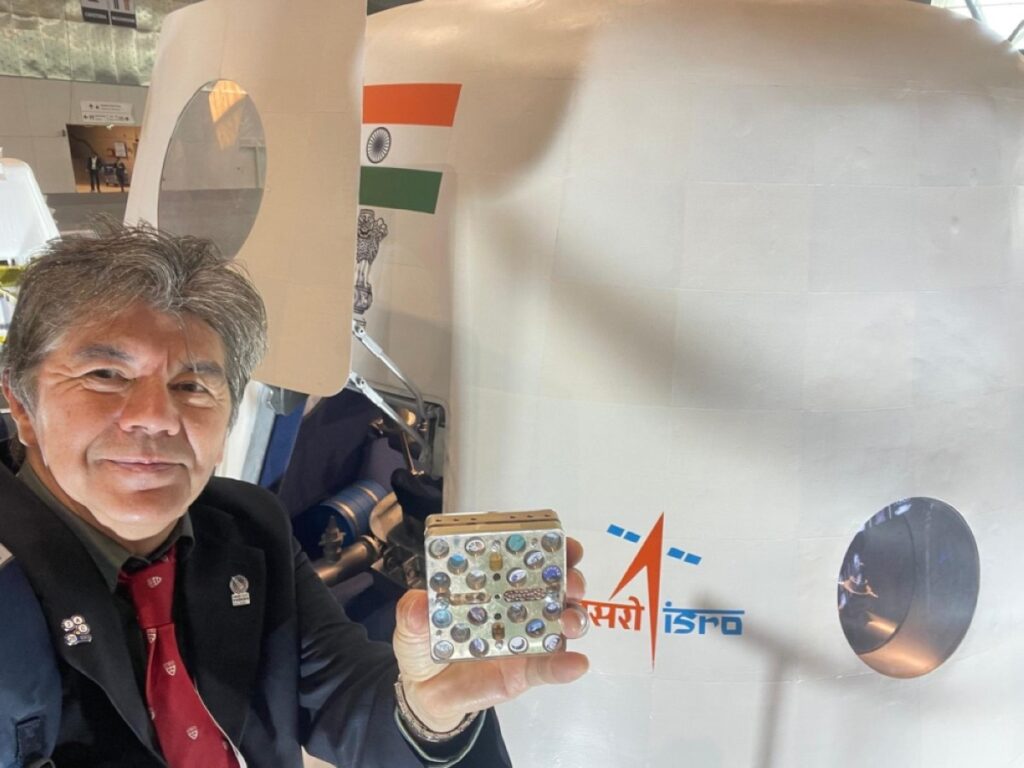KUWAIT: In a first-of-its-kind cultural and scientific venture, rocks from Kuwait’s Failaka Island were launched into space aboard a SpaceBy X capsule early Tuesday. The Advance Space Civilization Initiative (ASCI) partnered with Lunex EuroMoonMars, Space Renaissance International (SRI), and several other global space organizations for the “Space for All Gallery” mission, which included the Failaka rocks in its payload.
The “Space for All Gallery” is an international initiative that launched aboard The Exploration Company’s Nyx capsule on June 23, 2025 via SpaceX Falcon 9 from Vandenberg Space Force Base in California. The capsule carried a diverse payload of science samples, art and cultural artifacts into low Earth orbit before it was supposed to return for study and public display. Spearheaded by LUNEX CEO and SRI President Prof Bernard Foing, the “Mission Possible” project aims to promote inclusive access to space through science, technology and the arts.
In an update posted approximately 12 hours after liftoff, The Exploration Company confirmed that the capsule had successfully powered on its passenger payloads, stabilized itself after separation from the rocket’s upper stage, reentered Earth’s atmosphere and reestablished communication following an expected blackout period. Despite a successful reentry and the reestablishment of communication, the company reported that it lost contact with the capsule just minutes before the expected splashdown. The Exploration Company deemed the mission “a partial success” and said it was investigating the root cause of the issue.
Speaking to Kuwait Times, Ghanim Al-Otaibi, co-founder of ASCI, shared details of the groundbreaking project and his team’s role: “I’m also a board member at the Space Renaissance Initiative (SRI), an international nonprofit think tank based in Italy. At SRI, we promote ideas like astronautical humanism and publish forward-looking research.”

A small tray containing compartments filled with miniature artworks and cultural items from around the world, including the Failaka rocks.

The Failaka rocks before they were loaded into the tray. The rocks were sliced in half before launch — one half remained in Kuwait, while the other half was sent into space.

A Falcon 9 rocket carrying 70 payloads for a variety of customers lifts off from California’s Vandenberg Space Force Base today on June 23, 2025.
Al-Otaibi has also been conducting academic research in Space-Based Solar Power (SBSP) at the University of Strathclyde in the UK. SBSP is an emerging technology that aims to harvest solar energy in space and beam it back to Earth — offering a promising solution to global energy challenges.
The Failaka rocks, collected by Al-Otaibi and astrophysicist Aziz Al-Areedh, were chosen for their profound cultural and historical importance. “Even though Failaka is no longer inhabited, its contribution continues — this time, to the future of humanity in space,” said Al-Otaibi. “The rocks symbolize a future rooted in the ancient heritage of our land.”
As part of the mission, a small tray was sent into space containing compartments filled with miniature artworks and cultural items from around the world. The Failaka rocks were sliced in half before launch — one half remains in Kuwait, while the other half were to be retrieved for post-flight analysis, particularly to study the effects of radiation exposure on terrestrial materials.
Located off Kuwait’s coast, Failaka Island has been a cradle of civilizations for millennia and was inhabited until the 1990s. Today, it stands as a key archaeological site. Al-Otaibi explained that the team saw the island’s geology as a powerful symbol of Kuwait’s identity — capable of communicating meaningful ideas through a small but significant gesture. The rocks, once returned, will become new archaeological artifacts for future generations.
Al-Otaibi’s passion for space began with Kuwait’s early space efforts, including the KuwaitSat-1 project and participation in international events like the “Moon Village” conference. In 2022, he joined the Space Renaissance Initiative and now leads its “Towards the Young Generation” committee, which aims to engage youth in the space sector.
The mission is part of the broader vision of ASCI, a Kuwait-based organization co-founded by Al-Otaibi to promote humanity’s expansion into space through education and the arts. ASCI is powered by a dynamic local team, including Dr Rawan Al-Shemmery, astrophysicist Al-Areedh and contributors Mohammed Al-Thuwainy and Mohammad Al-Failakawi.

